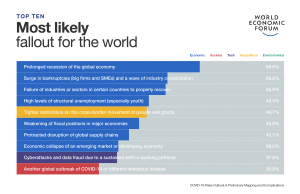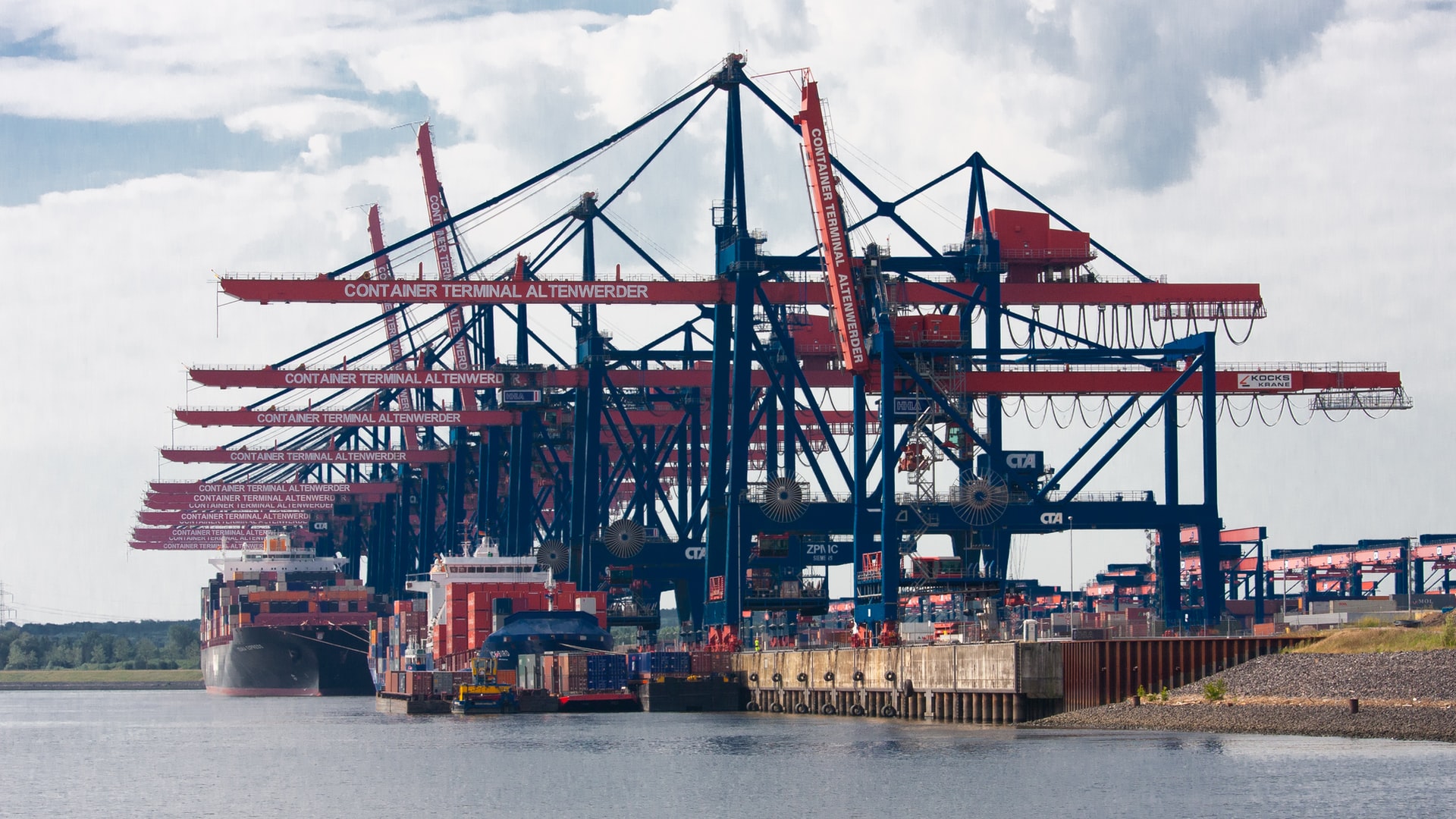Over the last few weeks, we have been sharing our thoughts about the implications of the global pandemic on our sector, especially concerning SE Asia and Singapore. We are fortunate to have one of the most stable economies in the world, with no net debt and high government revenue. We are also the world’s top maritime capital but we remain a small island nation whose fortunes are equally dependent on the ebb and flow of the wider global economy. In this blog, we’ll take a look at the economic ‘weather’ ahead, in and beyond Singapore, that’s likely to influence the speed and sustainability of our response to COVID19.
The Big Picture

Best Case. If the pandemic is quickly brought under control, 2020 global merchandise trade may only fall by 13% year-on-year compared to 2019. To put this further into perspective, an article in the Wall Street Journal says that, “Sea-Intelligence estimates the biggest international carriers will see combined losses ranging from $800 million to $23 billion this year..”. The optimistic 13%, whilst considerable, is something the industry can overcome, but anything higher could be detrimental to many, which brings us to the pessimistic scenario.
Worst Case. The WTO believes that without governments having a unified policy response, COVID19 could cause a decline of as much as 32% or more on trade. The Straits Times quotes WTO Chief Roberto Azevedo’s warning that the downturn “may well be the deepest economic recession or downturn of our lifetimes”.

Closer to home, Singapore’s government has pumped unprecedented support into the economy to enable citizens and businesses get through this initial phase, setting expectations that circuit breakers could be an on/off feature of life for a long time to come. Last month, Singapore’s Prime Minister Lee joined other ASEAN leaders, calling for regional unity in safeguarding the continued flow of trade between nations. This principle of a unified strategy in the battle again COVID19 was put into action shortly thereafter in the signing of a global agreement by the PM Lee and Singapore’s Maritime and Port Authority (MPA) with 20 nations across 3 continents to keep their ports open for trade which ensures major supply chains will remain open.

It’s a sobering read in which geopolitical uncertainties feature prominently, playing out in tighter restrictions on the cross-border movement of people and goods which hits right to the heart of the shipping and maritime services sector. More unity, alignment and forward planning by nations and world leaders are vital if we are to mitigate against even some on the roll-call of risks.
Chinese exports fell by 6.6% year-on-year to $185.15 billion in March 2020, according to Trading Economics but they unexpectedly rebounded in April when exports surged by 3.5% year-on-year. This has added a more optimistic outlook as results defied market expectations of a 12% plunge. More broadly, observers are talking a V-shaped recovery while others remain more cautious. Time will tell.
The Director-General Azevêdo of the WTO added context to the optimism, stating that, “the underlying causes of this economic crisis are very different from the previous ones. Our banks are not undercapitalized. The economic engine was in decent shape. But the pandemic cut the fuel line to the engine. If the fuel line is reconnected properly, a rapid, vigorous rebound is possible.” Positive words, but we need joined-up global thinking to feed into national policies if the sentiment is to have meaning.
But this analysis is itself is subject to huge risks and market nervousness. We will know soon if current efforts to begin restarting national economies lead to a resurgence in the virus. This could change the dynamics again by further prolonging the downturn in economic activity.
The Poseidon Principles

Competing for capital in the upcoming downturn will be difficult in its own right, but doing so against the added constraints of the Principles adds enormous complexity for charterers and shippers looking to the capital markets for investment in the foreseeable future.
The 18 banks currently signed up to the Poseidon Principles represent about $140bn of global shipping finance but the specifics of their lending policies are not yet fully understood. Given the nature of the Principles, it’s conceivable there might be no, or less competitive funding for vessels which negatively impact their climate alignment calculations. The shift to cleaner energy is going to wipe out a significant amount of capital anyway, but the Principles combined with COVID19 add yet more risk. Besides, demand for dry bulk and tanker vessels is set to shrink further which will already be impacting investment and CAPEX decisions in light of COVID19. A combination of all these factors creates great uncertainty in a market that’s already on edge with the inevitable shift to cleaner energy.
There are also calls from sustainability funds to use the COVID19 moment to infuse more energy into climate action. The World Economic Forum (WEF) recently laid out such a case, stating that, “the pandemic offers an opportunity to start building a sustainable ocean economy fit for the future”. It’s impossible to disagree with this view when the wheels are already in motion and the inevitability of change across the industry is a given.
Protecting our Seafarers
With all the “big picture” thinking and analysis we have been discussing, it is easy to forget about the unsung heroes who oil the machine of global trade; without seafarers, there would be no global economy, yet this segment of the maritime industry has had to endure COVID19’s impact under perhaps the most demanding of all conditions. If we look at their situation right now, this community has been enduring severe hardship due to port disembarkation restrictions and extended periods at sea.

Seafarer health screening at the Port of Singapore
In a recent video message, IMO Secretary-General Lee laid the responsibility for the proper care of mariners at the door of member states, stating that, “…We must also remember the hundreds of thousands of seafarers on ships. They are unwittingly on the front line of this global calamity.” Establishing policies to care for the physical and mental well-being of seafarers can’t come fast enough, given the awful accounts of their situations that continue to flow.
Stephen Cotton, General Secretary of the International Transport Federation (ITF) recently framed this problem as a human rights issue that UN member states are obligated to address, stating that, “There are 200,000 seafarers out there right now desperate to get home to their own beds, see their families and hug their kids. They’ve been stuck on these ships, keeping global trade running since this pandemic blew up. Enough is enough – they have earned their ticket home.” Against this backdrop, we welcome the MPA’s recent decision allowing for critical crew change movements at Singapore Port, which paves the way for weary seafarers to return to their homes via Changi Airport. In light of the promises of unity we have outlined above, we hope other nations and ports will join Singapore in facilitating our seafarers on their journeys to be reunited with families and loved ones.
Closing Thoughts
We are a relatively small company supporting the shipping sector in SE Asia and more recently in Europe. We cannot influence the complex and profound world events discussed in this series of blogs, but we can ensure that the ships and cargo they transport get the highest level of care when we carry out marine inspection, repair and maintenance services. In doing so, we believe our sustainability principles and ethics leave as light a footprint on the environment as possible. As a company that has a long history in the region, we are fortunate to be well resourced, agile and innovative which has allowed us to respond dynamically to the needs of our clients amid global events like COVID19.
In our first blog, we opened by sharing a memory from our first day back at work in January, following the Chinese New Year holidays. Little did we know what lay ahead, but the road to achieving the goals we planned remain our focus. We appreciate your continued support and look forward to helping you on your journey.
For further information on our services, please visit us here.
Related Articles
Talk To Our Team

Eugene’s responsibilities include business development and performance of the company’s business. He has spear headed the diversification of businesses and developed the various subsidiaries within the Group.


